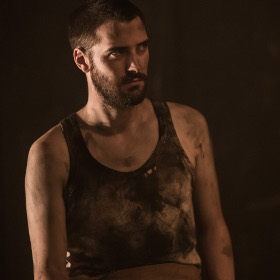The Love Girl and the Innocent

© Damian Robertson
“People are the most valuable capital.” Uttered by a prisoner detained in the relentless drudgery of a labour camp, the hypocrisy of these words reverberates through the denouement of Aleksandr Solzhenitsyn’s grim portrayal of life in a Soviet labour camp. The Nobel Prize winning writer’s play has been adapted by Matthew Dunster in what is the first London production in over 30 years.
It’s 1945 and a convoy of prisoners, convicted of crimes ranging from anti-Soviet behaviour to murder, arrive in the camp to begin their sentences on the harshest of terrains. As titles and jobs are allocated, (drawing lines of hierarchy and power), morals are teased out in desperate acts of survival and the communist regime seeps into the confinements of their holding.
Nemov, (played by Cian Barry) is the ordered and disciplined Production Chief, whose concerns of “decency and conscience” fade into the politically charged haze that surrounds the prisoners. Gang leaders clash, whilst workers in the foundry produce irons to be traded with oats and other crumbs from the world outside. There’s a pressing demand to increase productivity and the implementation of a “work or starve” system thrusts the prisoners into dire conditions.
Alongside the tragedy and hopelessness that frame the play are faint veins of comedy and love. Nemov falls in love with ‘love girl’ Lyuba, (played with a child-like countenance by Rebecca Oldfield) who uses her position to ease her circumstances with the prison administration. There’s momentary lightness delivered by Rob Tofield as Brylov, with Stevie Raine and Emily Dobbs also offering striking performances.
The cast of sixteen are noticeably strong, playing multiple roles across Anna Flesichle’s gloomy set; constructed of wooden shipping pallets, etchings on the walls and a high pile of burning tyres; entirely fitting for Solzhenitsyn’s bleak world. The crawling opening half of the play is relatively uneventful. It’s not until the arrival of the tyrannical Commandant that the pace plucks up and action, poignancy and impact filter into the production.
Dunster’s production conveys the brutality of the labour camps, creating a disturbing inner colony which turns on the political cogs that define the outside world. There’s turmoil but the production feels uneven and doesn’t quite grip with as much intensity as the material calls out for.
– Amardeep Sohi
@AmardeepSohi1










